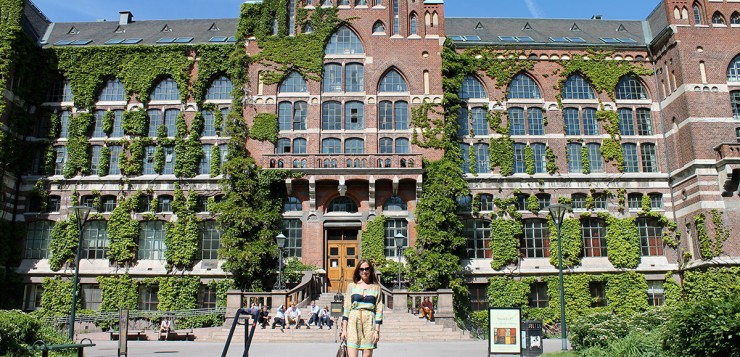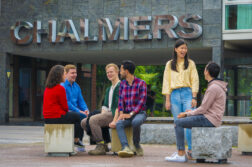Alona Bazlova is no stranger to world travel. She was born in St. Petersberg, Russia, and lived in Israel for a number of years before moving to Canada.
Her experiences have made her a natural traveller – always curious and excited to discover new places and people. However, she says that studying abroad brings a new dimension to the trip.
“It’s a very different experience,” says Alona. “You actually have the opportunity to immerse yourself in a new culture and feel like you are a part of it.”
While Alona’s time abroad in Sweden wasn’t her first trip, it was certainly a memorable one. It was an opportunity to immerse herself in a culture that she had heard so much about, and discover new things about herself.
Making a first connection
Alona had studied abroad before – she had spent a semester at the Chinese University of Hong Kong, after hearing all the amazing stories from a friend who had taken the trip before her. But during her time there, she also developed an unexpected interest in Sweden.
“While on exchange, I met many people from Sweden,” says Alona. “Almost immediately, I connected with a group of exchange students from Scandinavia. They always had great stories about Sweden, its culture, and its educational system.”
Sweden was on Alona’s mind, and when the opportunity arose to pursue a Master’s degree in a new destination, she jumped at the chance. Lund University immediately attracted her attention, and sealed the deal as she started making travel plans.
“I knew student life in Lund was very diverse,” says Alona. “There are many things you can get involved with, and there were a lot of things to do on campus and in the city.”
There was a lot to do. Alona did a lot of research and packing in the days leading up to her departure. Luckily, she was a fairly experienced traveller, who knew what the necessary preparations were for travelling to a new city.
“I tried to find out as much information as possible about the University, the city, what things I might need to bring with me that might be very expensive abroad,” says Alona. “I also had to figure out what type of insurance I would need, and how I would access my Canadian bank account.”
Preparing for the trip
As an experienced traveller, Alona knew she had to do a lot of research before her departure. Here are some of the things every traveller should look into:
- Learn about the city – it’s always a good idea to map the city and find out about the area you’ll be staying in, and the campus. Know the places where you can get groceries, get resources, transit routes, etc.
- Learn about the school – It’s terrifying enough getting lost on campus in your own city… minimize the stress by familiarizing yourself with the school’s layout in advance. Know where the important buildings are, such as the campus clinic, guidance counsellor, and admissions office.
- What items to bring – While you want to pack relatively light, there are certain things that are very expensive abroad that you’ll want to bring with you from home. Consider having heavy essentials shipped to your destination.
- Travel insurance – Accidents happen! While it’s unlikely you’ll run into complications if you plan well, being caught without the proper coverage isn’t something that you want to risk.
- Banking information – Find out how you will access your funds while you’re on your exchange. What kinds of cards will they accept? Will you need to use a currency exchange? Contact your bank with these questions before departing.
Experiencing Sweden
Alona was accepted into the Master of Arts program at Lund University, where she was to take a major in Communications and a minor in Business. She lived in student housing on campus with 11 other students, all studying at various levels of education, from undergraduate to PhD.
One challenge she encountered right off the bat was the language barrier. Most of the students she lived with spoke Swedish, making it difficult for Alona to join in on their conversations.
“It definitely took effort to get to know my roommates,” she said. “When they spoke Swedish, I would feel left out. But I learned to remind them about my presence, and they would switch back to English.”
“Studying abroad changes the way you see life and the way you want to live your life.”
– Alona Bazlova, 2015
Alona was surprised to find out that the educational system in Sweden was very similar to the one in Canada. There was one main difference – students did not have to take a lot of courses at once. Instead, each student would spend a month on one or two courses, pass the exams, and then move on to the next one.
Alona also found that the dynamic between professors and students was a lot more relaxed and casual in Sweden than it was in Canada. There were a lot of subtle differences between the educational system she was used to at the University of Ottawa and the University of Lund. But it was a welcome experience for her all the same.
“Studying abroad opened many horizons,” says Alona. “You have an opportunity to interact and study with people from a number of countries. You learn from them, learn how to get along and work together.”
Developing relationships abroad
One of the best parts about studying abroad is creating connections with people from different countries. Once Alona got used to overcoming her language barrier with her roommates, she found it much easier to forge new relationships with the people around her.
“I met really great people while studying in Sweden,” says Alona. “I am still in touch with my Master’s thesis professor and fellow classmates.”
Travel tip: Alona says the most important thing she learned during her trip to Sweden was how to adapt to new situations and feel comfortable around new people, even if they have different customs and a different background.
Alona says her roommates also made her trip extra special for her. While a lot of them were from Sweden, there was also a handful who were Canadian exchange students like herself, some of whom are still studying abroad in different countries.
Even now, Alona says she’s still in contact with her friends from her time in Sweden. They keep in contact through texts and Facebook messages. Whenever she’s in Europe, Alona says she always has friends that she can meet up with.
“I always enjoyed travelling and discovering new places… I see myself as a Global Citizen.”
– Alona Bazlova, 2015
“My favourite part about having friends in different parts of the world is that I can visit so many countries,” says Alona. “It’s amazing to see how small the world actually is, and how easily people can move from country to country.”
Alona’s insights for students & grads
After pursuing her Master’s degree abroad, Alona feels that she has developed a much stronger work ethic. She’s become much better at adapting to new routines and environments – a great quality for any career-minded traveller.
Her time abroad has only fuelled her adventurous spirit – and she hopes that she can incorporate her passion for travel into her career. Alona says she wants to find a company that provides her with growth opportunities and potential for working abroad.
“I think my experiences help me work with people from diverse backgrounds,” she says. “I’m not afraid of challenges and I’m always open to a new adventure.”
Alona’s advice for students & grads:
- Pick a destination that is outside your comfort zone
- Research student life
- Apply for various bursaries to finance your semester or year abroad
Alona says that if the opportunity presents itself, students and grads should definitely take a semester and study abroad. After all, her experiences have only changed her for the better.
“It’s a great opportunity to put yourself outside your comfort zone,” says Alona. “You will learn more about yourself, meet great people, and experience beautiful cultures.”
by Veronica Yao, Talentegg.ca
TalentEgg.ca is Canada’s leading job board and online career resource for college and university students and recent graduates.








Discussion1 Comment
merci